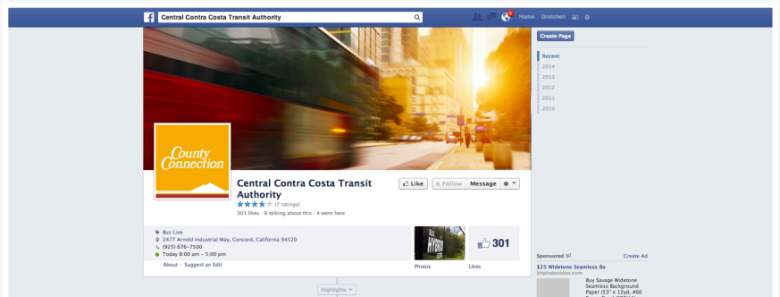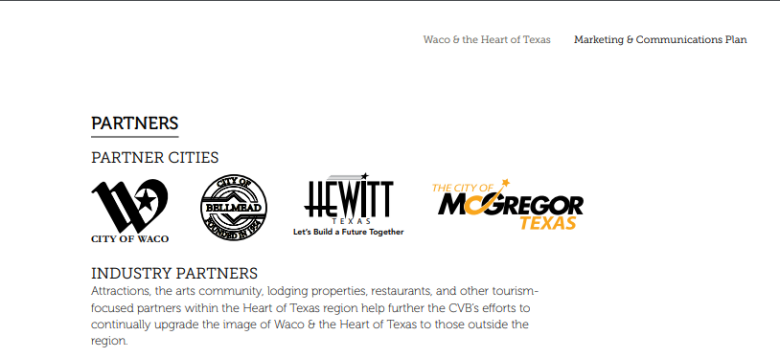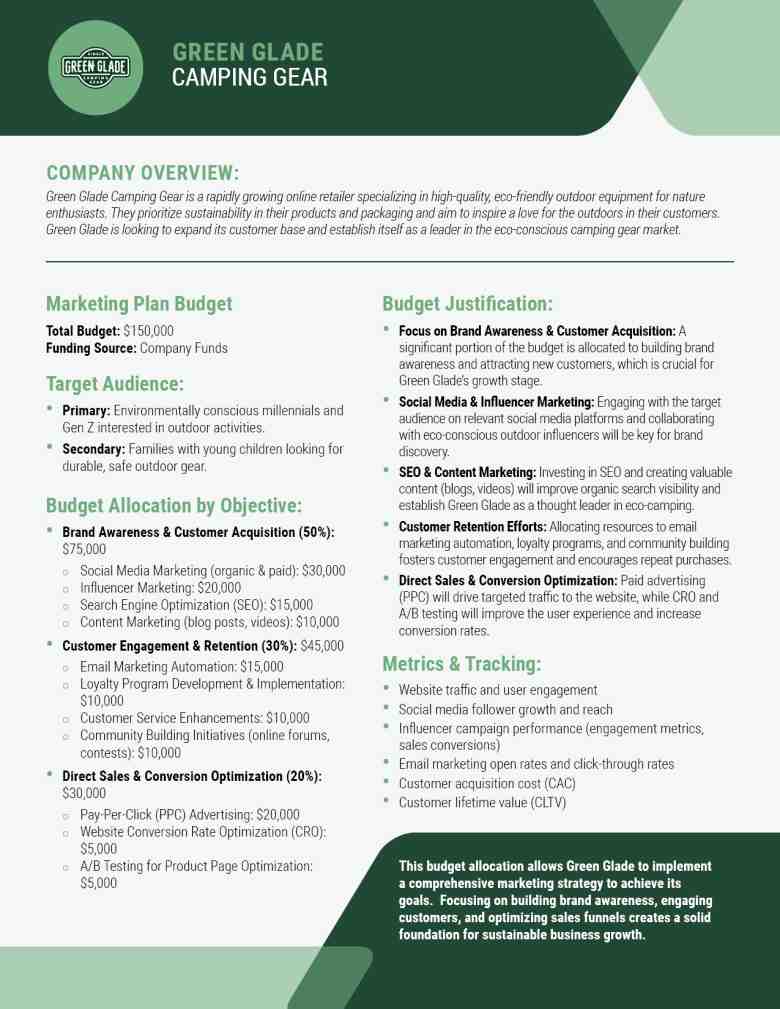Using AI to Generate a Marketing Plan Budget (with Prompts)

If you’re like most marketing managers, it’s easy to spend, but hard to budget. Now you can produce that budget in a fraction of the time, using our AI-powered Marketing Budget Assistant. You’ll also find AI prompts, FAQs, and best practices in this easy reference guide.
How to Use Our Marketing Budget Assistant
Just answer a few questions about your marketing goals, and our AI-powered assistant will create your marketing budget, instantly and free. Remember: the more information you give it, the better the budget you’ll get out of it.
More AI Prompts for Creating Your Marketing Plan Budget
Once you’ve drafted your marketing plan budget with the prompts above, here are further prompts to help you polish and perfect it.
- Optimize Budget Allocation: Analyze and suggest an optimized allocation of our marketing budget across various channels based on historical performance.
- Fine-Tune Target Audience: Refine our [target audience parameters] for better precision and alignment with our business goals.
- Evaluate ROI Projections: Calculate and provide ROI projections for [budget scenario] to inform decision-making.
- Identify Cost-Effective Strategies: Recommend cost-effective marketing strategies to achieve specific objectives within our budget constraints.
- Incorporate Seasonal Adjustments: Advise on adjusting our budget to account for seasonal fluctuations in our industry. [Insert Industry]
- Enhance KPI Selection: Suggest additional key performance indicators (KPIs) that align with our marketing objectives.
- Benchmark Against Competitors: Provide insights on [competitor] spending in our industry and suggest adjustments to our budget accordingly.
- Leverage Marketing Partnerships: Identify potential partners or collaborations that can maximize our budget’s impact.
- Adapt to Changing Strategies: Modify our budget template to accommodate any upcoming shifts in our business strategy.
- Ensure Regulatory Compliance: Offer guidance on budget adjustments required to ensure compliance with industry regulations.
Examples of Marketing Plan Budgets
Here are great examples of marketing plan budgets that you can use for inspiration. While your budget doesn’t need to be beautifully designed and produced (an Excel or Google Sheet will do), these budgets really make an impact, which is the point of marketing.
Visit Billings Marketing Plan and Budget

The Visit Billings marketing plan and budget strategically allocate resources towards measurable goals. It shows how funds for printed materials, website development, and advertising can build brand awareness for Billings as a tourist destination. The budget breakdown reveals a transparent allocation across various marketing activities.
County Connection Marketing Plan and Promotions Budget

This County Connection marketing plan and promotions budget utilize a targeted and multi-channel approach to reaching riders and potential riders. It uses cost-effective methods like social media and website improvements while also considering traditional channels like print and events. The County Connection marketing plan breaks down its budget allocation into categories, highlighting a strategic distribution of funds.
Waco & the Heart of Texas Marketing & Communications Plan Budget

This communications plan budget outlines four goals: promote, Engage, Educate, and Publicize. The plan identifies specific target audiences for each objective, allowing for focused marketing efforts. Additionally, various tactics are implemented to achieve each objective, including brand promotion events, social media presence, print and online advertising, media relations, and educational programs for citizens and businesses.
Discover how Media Shower can tailor your marketing plan budget through our Media Shower platform.
Sample Marketing Plan Budget Using AI
 Created with the Media Shower platform.
Created with the Media Shower platform.
This example budget invokes the fictional company Green Glade Camping Gear. The budget and content were created using our AI assistant, including a line-item breakdown of that budget and a justification for how it is spent. (To get full access to this AI assistant, sign up for a free trial.)
10 Best Practices for Marketing Plan Budgets
- Set Clear Objectives: Define specific and measurable marketing objectives to guide your budget allocation.
- Prioritize ROI: Allocate budget resources to strategies and channels with the highest potential return on investment.
- Regularly Review and Adjust: Monitor and adjust your budget based on performance data and market changes.
- Diversify Channels: Spread your budget across various marketing channels to reach a broader audience and mitigate risks.
- Consider Seasonality: Consider seasonal trends and adjust your budget to optimize effectiveness.
- Benchmark Competitors: Analyze competitor spending to gain insights and ensure your budget remains competitive.
- Leverage AI Insights: Utilize AI tools to provide data-driven recommendations for budget optimization.
- Allocate for Testing: Dedicate a portion of your budget for testing new strategies and tactics to identify what works best.
- Emergency Fund: Set aside a contingency budget for unforeseen opportunities or crises during the year.
- Document Assumptions: Document the assumptions and rationale behind your budget decisions for transparency and future reference.

FAQs About Creating a Marketing Plan Budget
How do I determine the proper marketing budget for my business?
Start by considering your business goals and industry benchmarks. Allocate the budget based on your objectives and expected returns.
What should be included in my marketing budget template?
Your budget template should include expenses for advertising, content creation, technology/tools, personnel, and any other relevant costs.
How often should I update my marketing plan budget template?
Reviewing and updating your budget quarterly or as significant changes occur in your business or market is advisable.
Are free tools or templates available for creating a marketing plan budget?
Yes, many free templates and budgeting tools are available online, which can serve as a starting point for your budgeting process.
What strategies can help me optimize my marketing budget for better ROI?
Focus on data-driven decision-making, test and refine your marketing strategies, and regularly analyze performance to make adjustments.
How can I ensure that my marketing budget aligns with my business objectives?
Clearly define your business objectives and KPIs, and then allocate your budget to activities directly contributing to achieving those goals.
What should I do if my marketing budget is limited?
Prioritize your marketing efforts, focus on the most cost-effective channels, and consider reallocating funds from underperforming areas.
10 Protips for Creating a Marketing Plan Budget Template With AI
- Align Goals: Ensure your budget aligns with specific marketing objectives by defining clear, measurable goals such as lead generation, brand awareness, or sales growth.
- Analyze Data: Base budget decisions on data-driven insights and past performance metrics, including conversion rates, customer acquisition cost, and return on investment.
- Research Competitors: Investigate competitors’ spending by analyzing their marketing strategies, identifying gaps or opportunities, and adjusting your budget accordingly.
- Experiment and Refine: Dedicate a budget portion for testing and refining marketing strategies, such as A/B testing ad creatives, to optimize performance.
- Adjust for Seasons: Modify the budget to account for seasonal fluctuations in demand by forecasting peak and off-peak periods and allocating resources accordingly.
- Prepare for Emergencies: Set aside a contingency fund for unforeseen marketing opportunities or crises, ensuring you have resources available when unexpected situations arise.
- Document Assumptions: Clearly document the rationale behind your budgeting decisions, including assumptions about market conditions, customer behavior, and expected outcomes.
- Regularly Review: Periodically review and adapt your budget throughout the year based on real-time performance data, industry changes, and shifts in business strategy.
- Track ROI Vigilantly: Continuously measure and evaluate the return on investment of your marketing activities, adjusting the budget to focus on high-ROI channels and campaigns.
- Stay Agile with Reallocation: Be ready to reallocate funds based on real-time performance data, shifting resources to initiatives that show the most promise and potential for growth.
The Media Shower platform helps you get marketing done. Get started with a free trial.
More Tools for Busy Marketing Managers:


